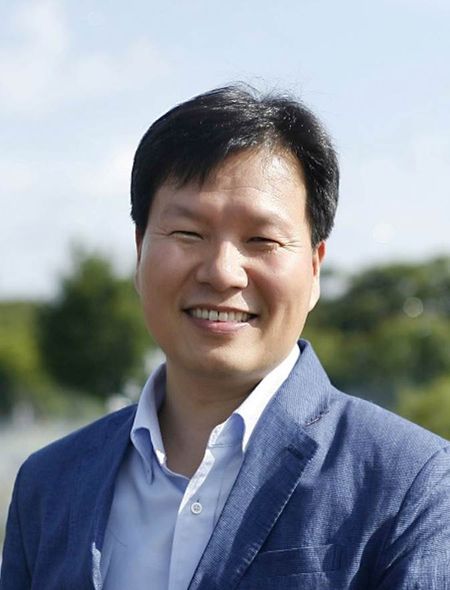주메뉴
- About IBS 연구원소개
-
Research Centers
연구단소개
- Research Outcomes
- Mathematics
- Physics
- Center for Theoretical Physics of the Universe(Particle Theory and Cosmology Group)
- Center for Theoretical Physics of the Universe(Cosmology, Gravity and Astroparticle Physics Group)
- Center for Exotic Nuclear Studies
- Center for Artificial Low Dimensional Electronic Systems
- Center for Underground Physics
- Center for Axion and Precision Physics Research
- Center for Theoretical Physics of Complex Systems
- Center for Quantum Nanoscience
- Center for Van der Waals Quantum Solids
- Chemistry
- Life Sciences
- Earth Science
- Interdisciplinary
- Center for Neuroscience Imaging Research(Neuro Technology Group)
- Center for Neuroscience Imaging Research(Cognitive and Computational Neuroscience Group)
- Center for Algorithmic and Robotized Synthesis
- Center for Genome Engineering
- Center for Nanomedicine
- Center for Biomolecular and Cellular Structure
- Center for 2D Quantum Heterostructures
- Center for Quantum Conversion Research
- Institutes
- Korea Virus Research Institute
- News Center 뉴스 센터
- Career 인재초빙
- Living in Korea IBS School-UST
- IBS School 윤리경영


주메뉴
- About IBS
-
Research Centers
- Research Outcomes
- Mathematics
- Physics
- Center for Theoretical Physics of the Universe(Particle Theory and Cosmology Group)
- Center for Theoretical Physics of the Universe(Cosmology, Gravity and Astroparticle Physics Group)
- Center for Exotic Nuclear Studies
- Center for Artificial Low Dimensional Electronic Systems
- Center for Underground Physics
- Center for Axion and Precision Physics Research
- Center for Theoretical Physics of Complex Systems
- Center for Quantum Nanoscience
- Center for Van der Waals Quantum Solids
- Chemistry
- Life Sciences
- Earth Science
- Interdisciplinary
- Center for Neuroscience Imaging Research(Neuro Technology Group)
- Center for Neuroscience Imaging Research(Cognitive and Computational Neuroscience Group)
- Center for Algorithmic and Robotized Synthesis
- Center for Genome Engineering
- Center for Nanomedicine
- Center for Biomolecular and Cellular Structure
- Center for 2D Quantum Heterostructures
- Center for Quantum Conversion Research
- Institutes
- Korea Virus Research Institute
- News Center
- Career
- Living in Korea
- IBS School
News Center
| Title | IBS Group Leader HEO Won-Do Awarded Scientist of April 2017 | ||||
|---|---|---|---|---|---|
| Name | Department of Communications | Registration Date | 2017-04-06 | Hits | 4258 |
| att. |
 thumb.jpg
thumb.jpg
|
||||
IBS Group Leader HEO Won-Do Awarded Scientist of April 2017- In recognition of his contribution to the demonstration of the specificity and the improvement of genome engineering tools - HEO Won-Do, Group Leader from the Center for Cognition and Sociability at IBS, was chosen as the winner of the Scientist of the Month award for his work in developing next-generation optogenetics to identify the causes of calcium ion-related diseases, such as Alzheimer's disease and cancer, using laser or LED light without a surgical procedure or administration of drugs. Heo has extended the application of optogenetics by using botanical photoreceptors to adjust various proteins in the brain's neurons as well as in other types of cells. Optogenetics research has made great strides since Professor Karl Deisseroth of Stanford University in the U.S. succeeded in expressing channelrhodopsins, a photoreceptor derived from green algae, in animal cells and activating the cells with light. The team led by Heo opened a new chapter of technology to remotely control the functions of cells by activating calcium ion channels in addition to the neurons using channelrhodopsins. After joining IBS in 2012, he developed optical and protein engineering technologies for optogenetic research and published the results in Nature Methods and Nature Communications in 2014. His success in doubling mice's memory by adjusting the concentration of calcium in cells using light became the cover story of Nature Biotechnology in September 2015. The team developed OptoSTIM1, a calcium ion channel activation technology, which works as an optical remote control by changing the input and residence time of calcium ions in cells, depending on the intensity and duration of light cast on the fusion protein engineered by the team. Heo is working to find the essence of life phenomenon by working across the boundaries of phytobiology, cell biology, biochemistry, and brain science. His goal is to find a solution to combat brain diseases by applying the bioimaging techniques and optogenetics to brain science research. Heo delivered a lecture with the topic "development of next-generation bioimaging and optogenetics technology for a better understanding of the brain's function" at Jeju National University in March and has been active in educating teenagers and the general public about brain science. The Scientist of the Month award is a Ministerial Award from the Ministry of Science, ICT and Future Planning to boost scientists' morale and promote a scientific mind among the public. The monthly award with the prize of KRW 10 million is given to a researcher for his or her outstanding research achievement and contribution to the advancement of science.
|
|||||
| Next | |
|---|---|
| before |
- Content Manager
- Public Relations Team : Yim Ji Yeob 042-878-8173
- Last Update 2023-11-28 14:20












